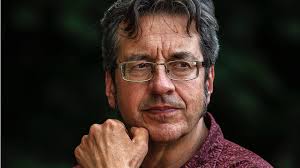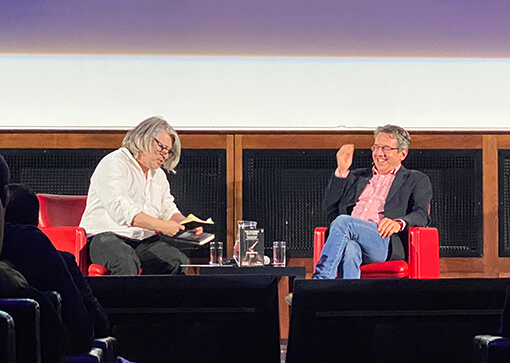Hi! It’s konkaz (@konkazuk).
My wife and I went to a talk by George Monbiot, the British environmentalist and writer, held at the Royal Geographical Society right next to Hyde Park.
This was a rare opportunity to hear Monbiot’s sharp insights into climate change, ecosystem restoration, and the relationship between politics and the media.
So in this article, I’ll be sharing what I took away from the event.
Who is George Monbiot?

To begin with, George Monbiot is a London-born environmental activist, journalist, and author who’s well known in the UK — and especially influential among young people engaged in the climate movement.
He has been writing columns for the British newspaper “The Guardian” for many years and is widely read and appreciated by readers around the world.
His major works include HEAT (also available in Japanese), REGENESIS, and THE INVISIBLE DOCTRINE, which was the focus of this talk.
He’s appeared on TED Talks and the BBC, but I personally started following George after seeing him on the YouTube channel Politics JOE. 👇
THE INVISIBLE DOCTRINE

This talk was held as part of the promotion for George’s book The Invisible Doctrine, which was released about a year ago and is now coming out in paperback from Penguin Books.
Just like the previous event featuring Gary Stevenson, this talk was hosted by How to Academy. However, this time, I felt the crowd had a slightly different energy.
At Gary’s event, there were a lot of relatively young men and women interested in economics, mostly giving off the impression of being hardworking professionals. On the other hand, at George’s event, the crowd seemed slightly older and appeared to have a bit more ease in their lives.
I imagine that Gary is striving to improve the world from the economic side, while George is doing the same from the environmental side. In between, there’s the political system issue that needs to be tackled, so to speak.

I had listened to the audiobook of “THE INVISIBLE DOCTRINE” about 10 months ago, so I was familiar with most of the content.
I remember that it gave an excellent and easy-to-understand explanation of capitalism and the term “Neoliberalism“.
To sum up, in the early 1980s, under the Conservative government led by Prime Minister Thatcher and U.S. President Reagan, the switch to “free-market economics” was activated, including deregulation, privatisation of public services, and cuts to social welfare.
As a result, the gap between those left behind and those who profited from the competitive society steadily widened, and even the Labour Party, originally intended to support the working class, shifted to the right, leading to the current dire situation.
Since it was first proposed by Austrian economists in the 1930s, the ideology of neoliberalism has been propagated by the wealthy, think tanks (which George refers to as ‘junk tanks’), the media, and politicians, planting the notion in society that individuals should be seen not as ‘citizens’ but as ‘consumers’.

The fundamental attitude is one of constant taking—take, take, take—and when that becomes empty, they simply move on to the next. This approach worsens many contemporary crises, such as economic inequality, the deterioration of public services, and environmental destruction.
George also pointed out that neoliberalism has transformed political and social systems to benefit “the wealthy”.
Through lobbying activities, large corporations and others influence the government, causing democracy to become something increasingly shaped by the interests of a small group with money and power.
Consequently, the general public begins to feel that ‘their voices are no longer being heard’ and that ‘politics no longer works for them’. Such feelings of hopelessness and discontent are then manipulated by leaders who seek to gain strong control by claiming, ‘I will change the nation!’
And….
this triggers the mentality of ‘Although it’s unrealistic, perhaps we should bet on this person, the one we haven’t tried yet’, and in the end, it leads to even more painful outcomes.
Summary

What I took away from George’s talk is that a competitive society, or free-market economy (i.e., neoliberalism), encourages people to focus on individual goals such as…
‘wanting a better home,’
‘wanting to travel more,’
‘wanting better possessions,’
and
‘working hard to leave more wealth for their children.’
When these personal or family goals are met, they are seen as the ultimate achievement.
As a result, I feel that this eventually weakens the sense of community and local connections.

And since everyone else is following the same path, you can’t back out alone.
But I believe that it is only with a sense of community that “give and take” can emerge, creating a balance between people and the environment.
George said that rather than relying on individual wealth, politics should focus on strengthening systems that ensure equal access for all ー such as transport, education, healthcare, and the natural environment. I couldn’t agree more.
It’s time for all of us to wake up.
Bye now,
konkaz
*You can read this blog post in Japanese from the link below.
👉 環境活動家モンビオが語る『見えざる支配』とは?新自由主義の正体

